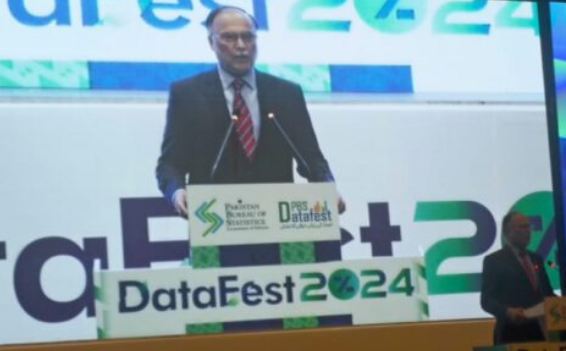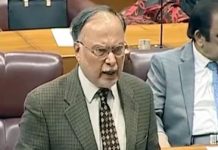ISLAMABAD, OCT 21 (DNA) — Federal Minister for Planning, Development and Special Initiatives, Ahsan Iqbal on Monday hoped that the annual volume of Pakistan’s economy will be $ 3 trillion and the country will be counted among the top 10 economies of the world in 100 years of independence in 1947.
In the current era, data-driven, knowledge economies are ruling the world, and data sets, data integration and Artificial Intelligence are significant for the sustainable economic development of any country, the Minister said. Federal Minister for Planning, Development and Special Initiatives, Ahsan Iqbal said this while addressing the ‘Data Fest 2024, Organized by Pakistan Bureau of Statistics (PBS) here.
Chairman NADRA Lieutenant, General, Muhammad Munir Afsar, Federal Secretary for Planning, Development and Special Initiatives, Owais Manzoor Samra, Chief Statistician, PBS, Naeem ul Zazfar and representatives of federal and provincial ministries and other stakeholders participated in the ceremony.
The main strategic partners for DataFest-2024 are UNICEF, UNFPA, the World Bank, ILO, UNHCR, FAO, ADB and these organizations bring extensive expertise in global development, public health, and education.
Federal Minister for Planning, Development and Special Initiatives said that today “we have entered a world that is undergoing the most rapid changes in human history and people who have seen the huge innovations and development in modern time.”
He said that now modern data science drives the economic revolution in the world, and data analytic and advanced technology have fueled the modern economic development and digital revolution.
He said that data science is the core of artificial intelligence, and its quality is the foundation of any economic theory and development in the modern world and for that, our economy needs very reliable data.
The Minister said that behind the economic development of any nation are 10 years of continuous policies, which pave the way for their development He said that now the government is working on the next five-year plan and today when I read the Vision 2025 made in 2014, it seemed that we had written the same problems we are facing today in the country.
In 2017-18, Pakistan had overcome the issue of energy and terrorism, the country was moving fast with the China Pakistan Economic Corridor (CPEC), but today we are back to where we were in 2013. He said that for sustainable economic development in the country, we need continuity of policies to achieve our economic goals.
“Our economy needs reliable data, with which we can measure the direction of progress.” Similarly, data sets are also required for business development and only the nations, businesses or individuals can use data in a better way can achieve their economic goals, he said.
“I am happy that there are a large number of young people here today, who will determine their future through data science and youth should have the ability to use data properly. Our young generation is going to participate in an economic marathon race based on modern technology and data-driven economies” he said.
On the occasion, the minister underscored the importance of data-driven decision-making in addressing key issues such as poverty alleviation, education, and healthcare while encouraging collaboration between public and private sectors. He highlighted the importance of utilizing big data and data analytics for the prosperity and well-being of Pakistan’s future.
He said that today,” We have presented the positive side of Pakistan to the world through the three days head of the government meeting of ‘Shanghai Cooperation Organization’ in Islamabad.” He said that all economic indicators of the country are showing positive.
The inflation rate is down at single digits and our youth have the potential to take Pakistan to a high position in the world. He appreciated PBS’s efforts in organizing the successful Data Fest-2024 and thanked all international delegations of Nepal, Oman, Thailand, Australia, Uzbekistan, Azerbaijan and Iran for their participation and all university students for joining this event.
While addressing the ceremony, Federal Secretary for Planning, Development and Special Initiatives, Owais Manzoor Samra said that data integration, visualization and cutting-edge technology are ways forward for the country’s sustainable economic development.
Chief Statistician, PBS, Naeem- ul – Zafar said that today data science is leading every sector of the economy and in Pakistan data-driven economy must be for sustainable economic development.
Under the theme “Data for Life and Equity”, the festival addressed key areas such as Fiscal Resilience, Governance and Growth, Climate Change Adaptation, Disaster Risk Management, and Data Integration and Visualization.
The aim was to foster collaboration, knowledge sharing, and actionable strategies to tackle pressing challenges in Pakistan, including healthcare access, social equity, and sustainable development.
In a major step to enhance collaboration across sectors, multiple Memorandum of Understanding (MoUs) have been signed with organizations in technology, academia, finance, and government. These partnerships aim to advance key initiatives, including collaborative research on cutting-edge data technologies like artificial intelligence and big data, and to develop educational programs that up-skill professionals in data science.
The agreements will also establish data-sharing frameworks to foster innovation and support internship opportunities for students. “Partnering through these MoUs will enable us to leverage our strengths to drive innovation in data utilization,” said Mr. Muhammad Sarwar Gondal , PBS spokesperson.
Key Activities of the event were, Thematic Discussions comprising engaging sessions on governance, climate resilience, and more, with participation from stakeholders including UNICEF, UNFPA, the World Bank, NADRA and SUPARCO. —DNA

















